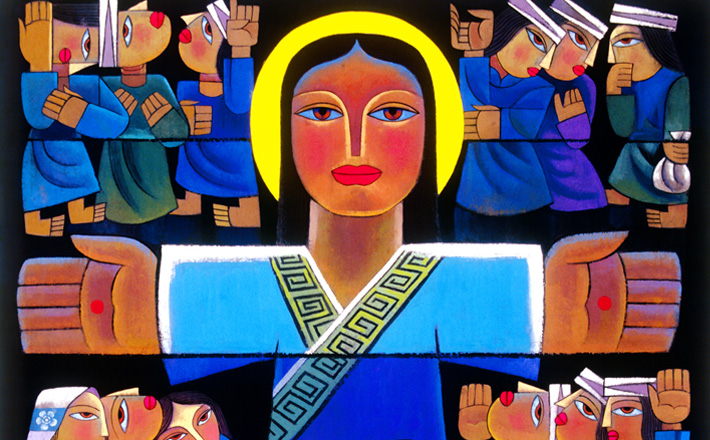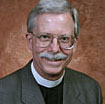Commentary on Revelation 1:4-8
On “Doubting Thomas” Sunday, it is hard to entertain the possibility of preaching on another text. Revelation 1:4-8, however, gives us three good options.
1. The Second through the Seventh Sundays of Easter (Year C) provide the preacher with the longest string of consecutive lessons from Revelation anywhere in the Revised Common Lectionary. Okay, there is no other string of lessons from Revelation, but this Easter cycle gives us an opportunity to lift up the wonderful witness of John the Seer. Our pericope includes the address to the recipients as well as a ringing statement of the two themes of the entire book.
John writes “to the seven churches that are in Asia.” Asia refers to the Roman province of that name; today it is western Turkey. Seven, of course, is the number of completion. To write to seven churches is to write to all churches. John’s greeting begins in a way similar to Paul’s letter openings: “Grace to you and peace,” and it continues with a three-point formula.
•First, the greeting is from “him who is and who was and who is to come,” a statement that echoes Exodus 3:13-14. Thus, the same God who was is also now. God has not retired! This God will continue to come.
•Second, the greeting is “from the seven spirits who are before his throne” (also in 3:1, 4:5, 5:6).
•Third, the greeting is from “Jesus Christ, the faithful witness, the firstborn of the dead, and the ruler of the kings of the earth.” Jesus Christ is further identified in three ways.
o “Faithful witness”: the Greek word for
witness is martys, from which
our word martyr comes. Actually,
in Greek, the words read, “Jesus Christ,
the witness, the faithful one, the
firstborn …” Jesus is above all the
witness, the martyr, the one who has
given his witness all the way to death.
In that way, he has indeed been the
faithful one.
o But Jesus has also been resurrected, and so
he is the firstborn of or from the dead.
For Christians who live with the threat of
arrest and possible death, the fact that
Jesus was the martyr above all martyrs,
the one who was faithful, and the one who
is the first one resurrected (thus there
will be more) must have been extremely
important and encouraging. Christians were
following not just anyone; they were
following this Jesus.
o And Jesus is now “the ruler of the kings
of the earth,” which means that he is
ultimately the one who rules over those
who claim to be this earth’s rulers,
especially the emperors of Rome (see
verses 7-8).
The rest of verse 5 and all of verse 6 are a doxology (ascribing glory, the Greek do,xa) to Christ.
Jesus is glorified because:
•he loves us (the way Revelation is often read the love of God in Christ can easily be lost);
•he freed or released us from our sins by his blood (in Revelation Jesus is always the slaughtered Lamb who died for us);
•he made us to be a kingdom and priests (that is, he made believers a kingdom, each member of which is a priest to God; these are ancient privileges of Israel; see Exodus 19:6).
Verse 7 provides the first overarching theme of the book: Jesus will return. The first theme is one we automatically associate with Revelation, and John concludes it with a bilingual double-whammy: “So it is to be” (the Greek word yes), and “Amen” (the Hebrew for let it be so).
Verse 8 gives us the second overarching theme: God is God. Perhaps that is not so obvious a theme, but the constant battle in Revelation is between the true God, the God of Israel, the God of Jesus, and the false gods of this world epitomized in the emperor of Rome. In contrast to the false gods, the Lord, the one again “who is and who was and who is to come,” is the Alpha and the Omega. Alpha, of course, was the first letter of the Greek alphabet; Omega was the last letter. In a sense, God is before the beginning and after the end. Moreover, this God is the Almighty, the All-Powerful One. It is a title claimed by the emperor–as are Lord and God. “Here,” writes John, “is God. Beside him there is no other.” And so preachers may well want to ask, “Who are the gods attracting people today? And what does the true God say to us about them?”
2. The Revelation lesson gives us an opening to talk about Christology in ways we may not have had on Easter. All or any one of the many titles of verse 5 could be explored. Taken together they outline a full Christology that includes life, death, resurrection, and present lordship. The Christological emphasis continues with the love of Christ and his freeing action by means of his death (verses 5b-6), and in verse 7 we look forward to the coming of Jesus as the final judge.
3. Finally, Revelation and the Acts passage for this day work well together. Peter and the apostles had been ordered to stop teaching in the name of Jesus, but they have refused. When hauled before the high priest, they answer, “We must obey God rather than any human authority” (Acts 5:29). Once again, the question is–who is God? Who is the God who is to be worshipped and obeyed? But–alas?–that returns us to the Doubting Thomas story, where Thomas calls Jesus, “My Lord and my God!” That exclamation raises, in turn, the question: Who is the Lord of this world? And that returns us to the Revelation text.
So we avoided Thomas in two out of three cases! A .667 batting average is not too bad at the beginning of the baseball season, but all joking aside, the three lessons together raise each person’s most fundamental question: Who is God?


April 11, 2010